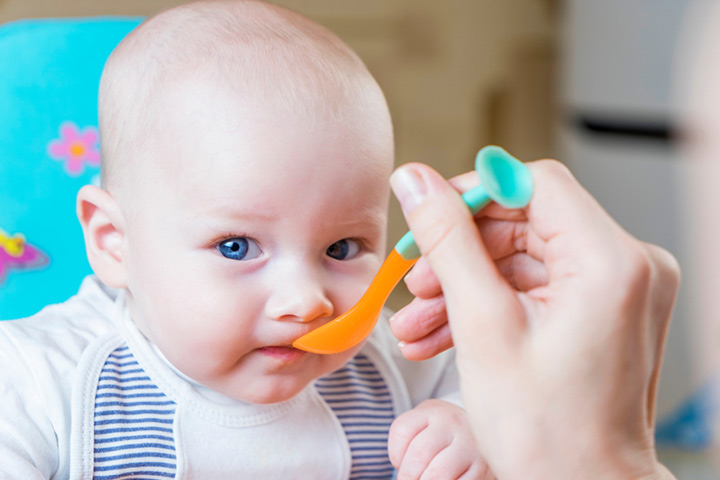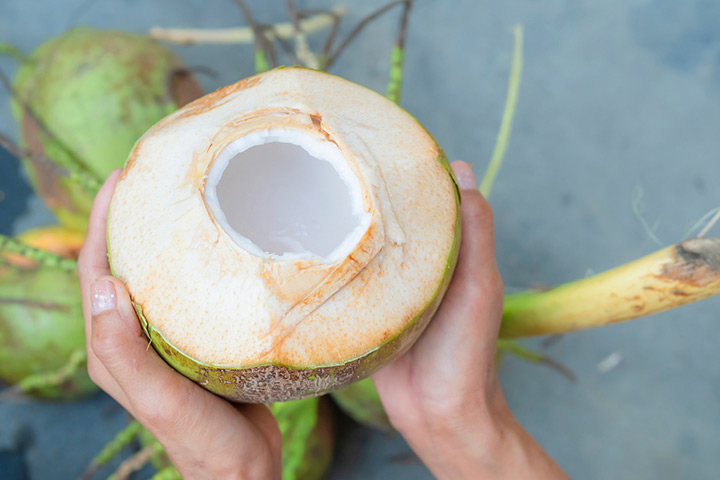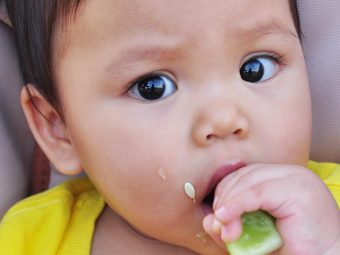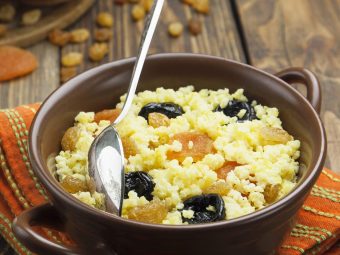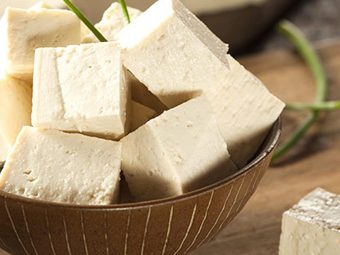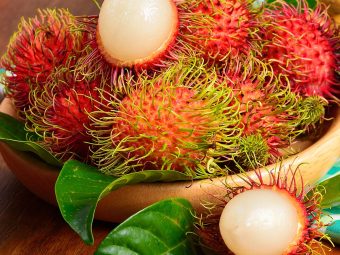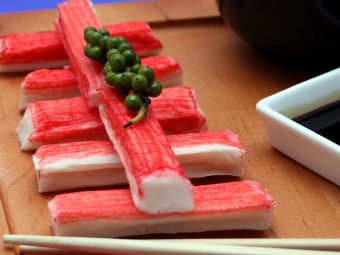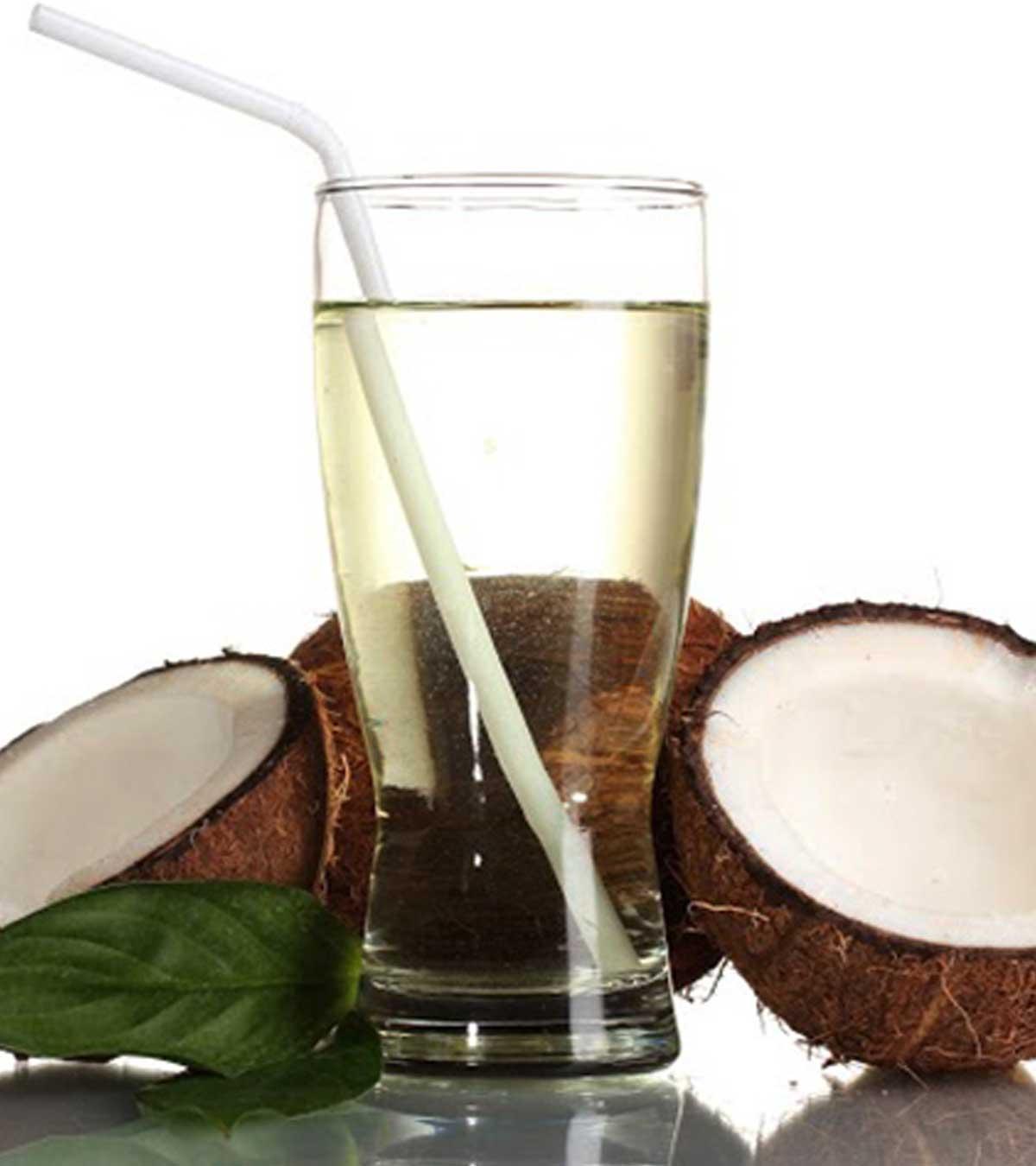
Image: ShutterStock
Coconut water for babies is ideally introduced after the first six months. Apart from having rejuvenating effects, a tender coconut drink is known for its high nutritional and medicinal benefits (1). Though it is a popular health drink loved by adults, especially athletes, most parents wonder if they may give this drink to their babies and if it is good for baby hydration.
Read on the post to explore the benefits, some important measures, the right age, and ways to begin feeding coconut water for babies.
Is Coconut Water Good For Babies?
According to the U.S. National Institutes of Health, coconut water is considered safe for children in general (2). There is no research to note the use of coconut water specifically for babies. However, coconut water is rich in electrolytesiXMinerals present in blood and bodily fluids that carry an electric charge and are crucial for essential body functions. , carbohydrates, vitamins, and amino acidsiXThe building block of life whose molecules combine to form protein. (3), and these nutrients are required for a baby’s growth.
When Can Babies Have Coconut Water?
Image: Shutterstock
You may introduce coconut water after the baby attains the age of six months old. The American Academy of Pediatrics states that water can be added to a baby’s diet once they begin consuming solids (4). However, introduce it in one or two spoonfuls and check if there are any adverse reactions. Also, do not introduce two new foods at a time.
 Point to consider
Point to considerNutritional Value of Coconut Water
100g of coconut water contains the following nutrients.
| Name | Amount | RDA (per day) |
|---|---|---|
| Water | 94.99g | – |
| Energy | 19kCal | – |
| Sugars, total | 2.61g | – |
| Calcium | 24mg | 270mg (7-12 months) |
| Magnesium | 25mg | 60mg (7-12 months) |
| Phosphorus | 20mg | 275mg (7-12 months) |
| Potassium | 250mg | 700mg (7-12 months) |
| Sodium | 105mg | 200mg (7-12 months) |
Source: U.S. Department of Agriculture (5), World Health Organization (6), and U.S. National Institutes of Health (7)
Benefits of Coconut Water
Coconut water can have the following health benefits for babies.
- Refreshing source of energy: Coconut water contains carbohydrates, which can help meet your baby’s daily quota of the nutrient.
Image: Shutterstock
- Provides hydration and electrolytes: Coconut water contains potassium and sodium. It also contains minerals, such as calcium, iron, phosphorus, magnesium, and manganese which are essential for bone development and health (8). Coconut water can be used as a rehydration drink during the summer months. It can also be useful in restoring electrolyte balance in infants with diarrhea (9). This makes coconut water an important source of pediatric nutrition.
- May improve digestion and absorption: Some research studies have shown that regular consumption of coconut water might aid in improving digestive health and infant gut health as well as enhance the process of nutrient absorption (10). However, this warrants more research.
- Rich in amino acids: Coconut water is rich in amino acids, like alanine, arginine, serene, and cysteine (11). It can make coconut water a healthy source of protein for a growing baby.
 Quick fact
Quick factCoconut water has several benefits tagged to it. But it is also important to know if there are any risks of giving coconut water to babies.
Possible Risks of Coconut Water For Babies
Coconut may pose the following risks to a baby.
- Allergic reaction: Allergic reactions to oral consumption of coconut are rare (12). But it is still good to be alert towards any reaction when feeding coconut water to a baby for the first time. You need to be extra careful if your baby already has other food allergies like allergy towards peanuts or other tree nuts.
Image: Shutterstock
- Hyperkalemia: Coconut water is rich in potassium. Feeding the baby very excessive amounts of coconut water may trigger a condition called hyperkalemia, where the potassium levels in the blood become high (13). However, it is unlikely to happen if the baby is fed a normal quantity of coconut water, like water and other fluids.
Measures To Follow While Giving Coconut Water To Babies
Image: Shutterstock
Coconut water is naturally sterileiXClean or free from microorganisms. as the water permeatesiXSpread through or pervade. through the huskiXOuter shell. and is filtered (10). Therefore, you need not boil coconut water before serving it to a baby. However, keep the following measures in mind when you decide to feed coconut water to the baby.
- Serve fresh: Use freshly extracted water from a green coconut. If fresh coconut water is unavailable, then you may opt for packaged coconut water. However, check for the date of manufacturing and the presence of preservatives. Go for pure coconut water and not the ones made with water and coconut water concentrate.
 Quick tip
Quick tip- Take it slow: Introduce coconut water in small sips, and then wait for a day or two to check for allergies. If the baby is not allergic and seems to enjoy the taste, then you may give coconut water to the baby regularly. Sometimes, a food item may show cross-reactivity with other food and cause allergy. Therefore, continue to stay alert even if the baby did not show any signs initially
- Avoid stored coconut water: Avoid storing fresh coconut water in the refrigerator for later use since storage might alter the taste and nutritional value. In the case of packaged coconut water, you may store it for an hour after opening the bottle. However, it is best not to feed a baby from opened and stored packaged coconut water.
Frequently Asked Questions
1. Can I give coconut water to my baby during cold and flu?
Cold and flu might cause dehydration. Therefore, you may consider giving coconut water for rehydration but consult a pediatrician before doing that.
2. Is it okay to mix coconut water with infant formula?
Most formula manufacturers recommend making formula milk only in clean and boiled drinking water. Prepare for formula feeding as per the manufacturer’s instructions. Infant formulas already have optimum amounts of micronutrients.
3. Can I give coconut water instead of normal water to my baby?
Coconut water can be a supplementary food, but it should not replace water. Plain drinking water has no nutrients and calories, and provides only hydration. Replacing drinking water entirely with coconut water could cause the baby to consume excess nutrients. It may increase the risk of conditions like hyperkalemia – surplus potassium in the blood.
4. Can I give coconut water to my baby in winters?
Coconut water is a natural diureticiXA type of drug that causes the kidney to produce more urine and helps the body get rid of extra fluid and salt. , which means it increases the production of urine. Babies are likely to urinate more during winters. Hence, more consumption of coconut water might increase the frequency. When consumed in moderation, coconut water is unlikely to cause any problems.
5. Is coconut water good for constipation in babies?
Tender coconut water is a good source of dietary fiber. When consumed in large quantities, it improves bowel movement in adults. However, there is no explicit research done on children. Therefore, it is better to get a doctor’s recommendation to confirm the potential benefits of coconut water on your child’s condition.
6. Can babies drink coconut water during a fever?
You can introduce this healthy drink in small amounts to babies older than six months since they should be exclusively breastfed for the first six months of their lives. Like adults, babies can also benefit from consuming organic products and plant-based beverages such as coconut water as a supplement to regular water. However, you must introduce coconut water in small quantities initially to check for allergic reactions. Further, it is recommended to provide only freshly extracted coconut water to babies. However, check with your child’s healthcare provider first if they have any health conditions.
Infographic: Benefits And Side Effects of Giving Coconut Water To Babies
Coconut water is a well-known source of essential nutrients. However, if you are planning to give it to your baby, it is suggested that you weigh its benefits and side effects before making a decision. In the following infographic, we have a table to help you make an informed choice. Read on! Illustration: Momjunction Design Team
Key Pointers
- Coconut water is a nutrient-rich drink that is safe for babies above six months, unless they have allergies such as nut allergies.
- Coconut water energizes, hydrates, restores electrolytes, and may improve digestion and nutrient absorption in babies.
- However, excessive consumption of coconut water may lead to allergic reactions or increased blood potassium levels in babies.
- It is ideal to introduce fresh and small amounts of coconut water to babies to check for any allergies or cross-reactions.
References
1. Shubhashree Thejasvi; Therapeutic and Nutritional Values of Narikelodaka (Tender Coconut Water) -A Review; Researchgate
2. Coconut Water; Medline Plus; U.S National Library of Medicine
3. P. Chauhan et al.; A refreshing beverage from mature coconut water blended with lemon juice; National Center For Biotechnology Information (2014)
4. Starting Solid Foods; Healthy Children; American Academy of Pediatrics
5. Nuts, coconut water (liquid from coconuts); Fooddata Central; USDA
6. Feeding And Nutrition of Infants And Young Children; WHO
7. Dietary Reference Intakes for Calcium, Phosphorus, Magnesium, Vitamin D, and Fluoride; National Academy of Medicine; National Center For Biotechnology Information
8. Diarrhea; Columbia University Medical Center
9. Adams W and Bratt DE; Young coconut water for home rehydration in children with mild gastroenteritis.; National Center For Biotechnology Information (1992)
10. Nwakunite Lawrencia Chinasa; Nutritional Health Benefit Of Coconut (Cocos Nucifera) Water; Innovare Journal Of Food Science
11. Health Benefits; Coconut Development Board, Government of India
12. Coconut Allergy; Australian Society of Clinical Immunology and Allergy
13. Is coconut water healthy?; The Ohio State University
14. Frequently Asked Questions; Rehydration Project
15. Is Coconut Water a Laxative?; New Health Advisor
16. Oral rehydration; Narayana Health
17. Children with fever should eat what?; Vinmec hospitals





